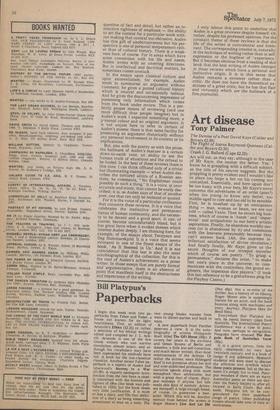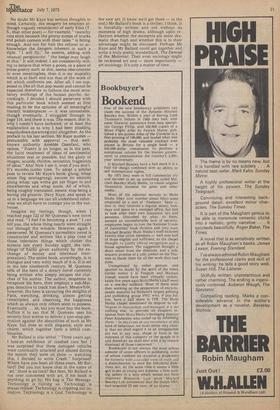Art disease
Tony Palmer
The Demise of a Poet David Kaye (Calder and Boyars £2.50) The Flight of Icarus Raymond Queneau (Calder and Boyars £2.50) Crash J. G. Ballard (Cape £2.25) Art will out, as they say, although in the case of Mr Kaye, the sooner the better. Yes, I know he is grappling with a difficult subject, as the title of his oeuvre suggests. But the, grappling is pretty evident and I wouldn't like to place too large a bet on his coming out unscathed. Essentially, and here again don't be too hasty with your bets, Mr Kaye's novel concerns the adventures of an artist (poet?) when too young to know any better, too middle-aged to care and too old to be sensible. First, he is touehed up by an omnipotent thing — man, woman or beast, we are not told — called Vanlo. Then he enters big business, which of course is harsh ' and ' impersonal ' and antipathetic to our hero's artistic aspirations. Finally, he abandons worldly success (or is abandoned by it) and communes with the heavens presumably because they can't answer back. (Ah, the supreme intellectual satisfaction of divine revelation.) And finally finally, Mr Kaye gives us the secret thoughts of our intrepid traveller which of course are poetry. "To grasp a permanence," declares the artist, "to make fast one's place in the universe, to communicate with the controllers, the grand engineers, the imperious dice players." (I took this last reference to be a gratuituous plug for the Playboy Casino.) No doubt Mr Kaye has serious thoughts in mind, Certainly, the imagery he employs although vaguely reminiscent of early Eliot (T. S., that other poet) — for example, " raunchy cats slink beneath the greasy sumps of trucks and polish corners with their tales "is biting enough. And not for him the refusal to acknowledge the dangers inherent in such a style. "I will fly," he asserts, adding with unusual perspicacity: " the hedge may laugh at this." It will indeed. I am consistently willing to believe that when a poem, or a piece of prose-poetry such as this, seems obscurantist or even meaningless, then it is my stupidity which is at fault and not that of the work of art which confronts me. After all, I am supposed to like all that pop music and cannot be expected therefore to fathom the more revelatory workings of the human psyche. Accordingly, I decided I should persevere with this particular book which seemed at first reading to be the epitome of all meaningful literary masterpieces — it was unreadable, though eventually, I struggled through to page 116, and there it was. The reason, that is, why I needn't have bothered; or at least the explanation as to why I had been plodding wearilydownthewrongtrail altogether. As the preface to his last section, Mr Kaye quotes — presumably with approval — that wellknown authority Amedee Ozenfant, who opines, "Poetry is no longer, as in the past, the lucid treatment of ideas of sentimental situations real or possible, but the glory of images, sounds, rhythm, sensation, fragments of ideas." Aha! Now I see it, even if you don't. It's mumbo-jumbo time. To adopt a similar pose to review Mr Kaye's book: glung, whap zoom fleg mortagrongi, swoom ini smoomi glung whap; upa witha get yer finger in and strawberries and whap zoom. All of which, being roughly translated, means: stop being a boring old groover, Davy Kaye, and speak to us in a language we can all understand otherwise we shall have to consign you to the nuthouse.
Imagine my feelings, though, when I reached page 122 of Mr Queneau's new novel and read, "I feel I'm becoming a poet." I can tell you, the whole thing nearly went straight out through the window. However, again I persevered. M. Queneau's surrealistic novel is constructed and written like a play (one of those television things which clutter the screens late every Sunday night, the ramblings-orENEki given authority by the exchange of money and televisual interpretation). The entire book, accordingly, is in dialogue and very witty much of it is. It is set in the late nineteenth century. M. Queneau tells of the hero of a dreary novel currently being written who simply escapes the clutches of his author. The author, desperate to recapture his hero, then employs a sub-Maigret detective to track him down. Meanwhile, however, the hero is savouring the delights of Paris, wenching, drinking, almost getting conscripted, and observing the happiness which as always only others seem to possess. Eventually ... ah, but you must buy the book. Suffice it to say that M. Queneau uses his seventy-four scenes to deliver a non-stop peroration against the absurdities of such as Mr Kaye, but does so with elegance, style and charm, which together form a lethal combination.
Mr Ballard is also lethal. " Three years ago, I held an exhibition of crashed cars but I was surprised that these damaged vehicles were continually attacked and abused during the month they were on show — watching this, I decided to write Crash." Surprised? Where have you been all these years, Mr Bal
lard? Did you not know that in the name of ' art ' there is no limit? But then, Mr Ballard is not over concerned with art, if his book is anything to go by. His bag is The Message. Technology is ruining us. Technology is
Sexual release. Technology is crippling our initiative. Technology is a God. Technology is
the new art. (I knew we'd get there — in the end.) Mr Ballard's book is a thriller, I think. It is forcefully written and not without its moments of high drama, although upon reflection whether the moments are more dramatic than high and whether this is to their advantage might be discussed. Perhaps Mr Kaye and Mr Ballard could get together and write a truly poetic wunderbuch, The Demise of the Motorcar. Then even sociology might be reckoned art and — more importantly — art sociology. It's only a matter of time ...













































 Previous page
Previous page